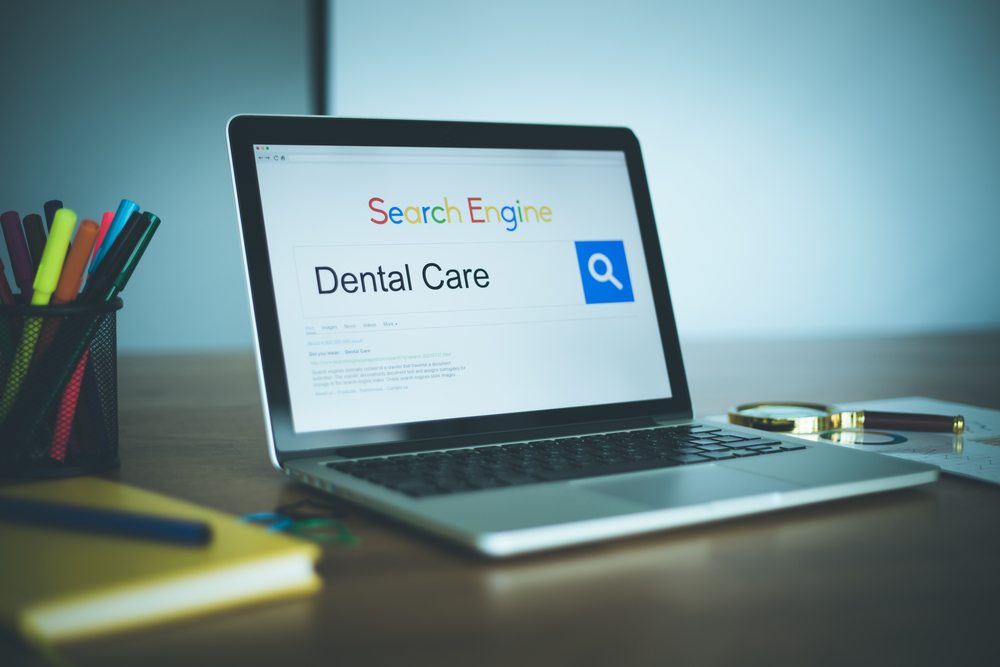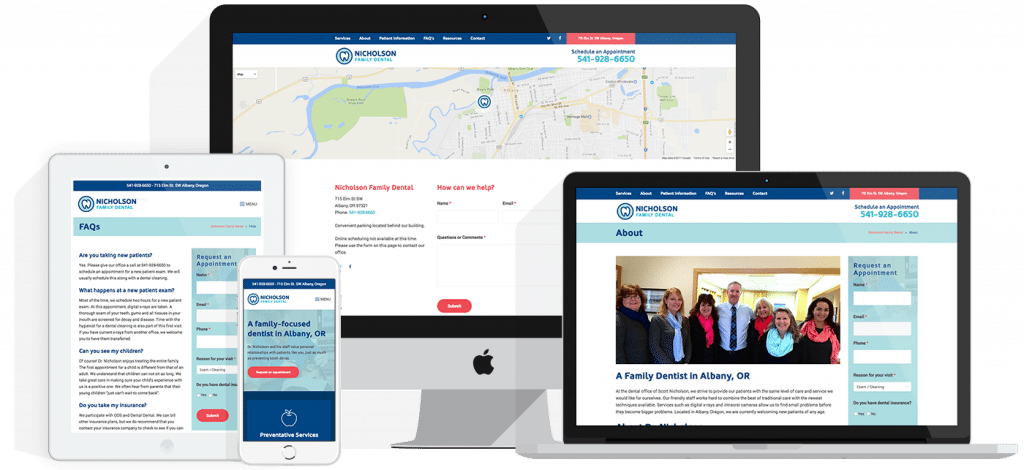
Digital Marketing for Dentists: Is it Really Necessary?
Not too long ago, choosing a dentist was an simple process. People would ask their friends for recommendations or would check with their families and picked based on instinct. Today, the tech revolution has taken the guesswork out of finding the right dentist for their needs and budget. Digital marketing for dentists is more important now than ever before.
Unlike a few years ago, when the only sources they could trust were their friends and families, people now have access to a wealth of information right at their fingertips. They can use search engines like Google to look for dentists in their area, read reviews on Yelp or use social media platforms like Facebook and YouTube to seek medical answers. In fact, 40% of consumers say that the information they find online affects their health decisions. 93% of them claim that it’s more convenient to find answers online than to call a dentist’s office.
Digital marketing for dentists has become more important than ever before. This change in how consumers research and shop their services can mean either bad news or good news. It all depends on how you react to the new rules of engagement. If you’re accustomed to getting new patients from referrals, it might be hard to adapt. Now that patients are flocking to the internet, dentists who don’t market themselves online will be at a real disadvantage. If your online presence is weak, you will get lost in a sea of dentists who understand that if they want to grow their practice, they need to conquer the digital world.
Because we know how overwhelming online marketing for dentists can be, we’ve put together this step-by-step guide to help you promote your practice.
Let’s dive in!
Search Engine Optimization (SEO) For Dentists.
In the past, people would have to visit their dentists for practically everything. Since they didn’t have access to specialized information, the only solution was to jump in their cars, drive to the dentist’s office and ask them about their medical issues. These days, due to the wealth of information online, people don’t necessarily have to book an appointment for a simple diagnostic.
Even when it comes to finding a dentist, people often turn to Google before they turn to friends and family recommendations or direct mail ads. So, if you want potential patients to find your business, you need a search engine optimization strategy.
Here’s what you need to do:
- Make Sure Your Website Contains NAP Information
The first thing you need to do is to check if your business name, address, and phone number (NAP) appear on the homepage of your website and preferably at the bottom of every page. Make sure the information is text and not an image. Google’s spiders cannot read images.
- Search Google for “Dentist + City/Zip Code.”
Pretend you’re a potential patient looking for a dentist in your area. Go to Google and enter the search term “Dentist” and your city or zip code (example: “dentist in Portland”) By analyzing the search results, you will get a better understanding of where your business is situated.
- Research Keyword Ideas
Most dentists think of the main keywords that are related to their business and use them to optimize their websites. But search habits can vary, and not everybody uses the same word or phrases.
For example, you might think that when people are looking for dental services, they type in “dentist in Portland, Oregon” or “dental office in Portland.” But what about variations of your main services? For instance, some people might search terms such as “dental implants” or “teeth whitening,” while others might search for more broad keywords like “dentist near me” or “dental care.”
To get a comprehensive list of keywords, go to Google’s Keyword Planner, type a keyword phrase (e.g.: “dental services”) and carefully examine the suggested ideas and ad groups.
If you are struggling to think of more keywords people might be searching for your dental practice, use Google Autocomplete. This tool is based on actual searches performed by users, so it can give you a valuable insight into what people are searching for on a particular subject.
Open Google and type in keywords like dental, toothache, root canal, implant, and so on. See what results you get.
Google Related Searches is another tool you can use to get related queries people might have used. Go to Google.com, type in your keywords and look at the related search terms suggested at the bottom of search results.
- Make a List of Relevant Keywords
After you’ve carefully researched all possibilities, it’s time to create a list of keywords that are truly relevant. Go through the list and remove everything that seems unrelated. Use keyword research tools to get valuable insights about how well your keywords will perform.
- Check for Both Head and Long Tail Keywords
Head keywords are typically just one to three words long and are very generic (example: “dentist”). Long-tail keywords, on the other hand, are made up of 3 or 5 words and are more specific (example: “affordable dentist in Portland, OR”). As a result, long-tails aren’t very competitive, but they can rank you higher than head terms.
It is important to have a balanced keywords strategy, so you should check for both head terms and long-tail terms. Although long-tail keywords don’t receive high search volumes, they are less competitive and, thus, convert better. Additionally, keeping a regular blog is a great way to improve ranking for long-tail keywords as you can build your blog strategy around specific terms!
- Use the Keywords in the Right Places
Now that you have a list of relevant keywords, it’s important to place them properly.
Website Backend: The critical places you need to put your keywords on your website backend are: the page title, meta description, meta keywords, alt tags for images, and the URL itself.
Website Frontend: The most important places you need to put your keywords on your website frontend are: page heading, subheads, main body, and image captions.
Search engines are becoming more “human” every day, so the best search strategy you can do is have a comprehensive website with a lot of useful information related to your key search terms.
- Avoid Keyword Stuffing
One of the biggest SEO mistakes you could make is using too many keywords. For example, don’t just throw everything you have on the homepage (dental services, dental implants, emergency dentist, toothache services, etc.) That will only confuse Google, and it won’t be able to identify what the page is about. Instead, create different landing pages that target a specific keyword. For example, create a specific page for “Dental Implants” where you can use keywords related to implants.
Now that we’ve covered the basics of SEO, it’s time to move to social media promotion.
Facebook Ads for Dentists
With 1.86 billion active users and the possibility to accurately target potential patients without draining your budget, Facebook advertising can generate significant business for your dental practice.
Why Facebook and not other social media networks?
Think about it this way. First of all, most of your audience is probably already on Facebook. The average American spends around 40 minutes a day on Facebook. Secondly, Facebook advertising provides extensive targeting options that include multiple variables, such as location, gender, age, demographics, behavior, and so on. You can use these factors to put your dental practice in front of specific, often motivated, potential patients.
Here’s how to increase your chances of getting more patients through Facebook ads:
- Write Compelling Headlines
One of the reasons people use Facebook is to unwind. Presenting them with your ads without being disruptive or intrusive can be a challenge. When your headline looks the same as your competitors’, people will ignore it. Spend enough time on your headline to ensure it communicates your message quickly and effectively. Use physiological triggers like curiosity, anticipation, or social proof to grab their attention. Don’t be afraid to be fun and conversational too!
- Make Your Ads Relevant
Relevancy is a crucial element when it comes to Facebook advertising for dentists. If your ads don’t target your audience needs effectively, then you are just wasting time and money.
- Make Them Visually Appealing
The human brain can process images 60,000 faster than text, so it should come as no surprise that visual ads get more engagement than text. Make sure to use compelling images that are relevant to your business. Most importantly, stay away from stock imagery if it looks too cliche.
- Include a Compelling Value Proposition
Tell your prospective patients why you are better than your competition. Describe how your services can solve their problems and improve their lives and explain the specific benefits they can expect.
- Include a Strong Call To Action & Offer
When writing your CTA, make sure to keep things simple and straightforward. Don’t make potential patients guess what they should do next – tell it to them in an easy-to-understand language. If possible, present new patients with an offer for coming in the door.
- Test Multiple Versions of the Ad
Test the headline, the ad text, the call-to-action, and so on. Make time to create multiple versions of the same ad and then test each one. Test different headlines with different ad texts, different call-to-actions and so on.
Pay Per Click Advertising (PPC) for Dentists
Before potential patients can find you on Google or like you on Facebook, they have to know that you exist. You can use SEO, content marketing, and social media marketing to grow organically and slowly get at the top of everybody’s mind. However, that takes time. In fact, it might take between three to six months to see any results from your SEO efforts. If you’re a small dental office struggling to stay afloat, you can’t afford to wait that long to increase your ranking and drive traffic to your website.
That is where Google AdWords comes into play.
Here’s what you need to know to get the most out of PPC:
- Set Specific Goals
The first step to any PPC campaign is to set measurable goals. Write down the results you are expecting to get and how much effort you are willing to invest. Example: “I will spend $500 on PPC advertising, and I will get 20% new leads in three months.”
It helps to have a good idea of your conversion rates and lifetime customer values before you engage in PPC advertising. That way you can easily know how well your campaign is performing, and if the ad spend is sustainable.
- Build a Comprehensive Keyword List
Research both your industry and your competition to come up with a list of keywords and key phrases that are relevant to your potential patients. Use the Keyword Planner to discover keywords you might not have considered.
- Select Your Target Audience
If you aren’t careful when targeting your ads, you might serve them to searchers who aren’t interested in your services. Best case scenario, they will ignore your ads; worse case scenario, they will click on them and then bounce without converting, costing you money.
Pay special attention to the targeting process. Target attributes like the geographic location; make sure it’s within driving distance from your dental office. Target the specific types of audiences based on age groups or income. Target the devices they are using and use other smart targeting strategies.
- Use Negative Keywords
One of the best features of Google AdWords is that it allows you to use negative keywords to let the search engine know which keywords it should exclude from searches. For instance, if you provide luxury dental services, you don’t want your ads to show up for “cheap dental services” or “affordable dental care.” So, you should add “cheap” and “affordable” as negative keywords.
- Test
A/B testing, or split testing, is a great way of measuring the effectiveness of your PPC campaigns. By creating a second version of your best performing ads, we can determine whether changing the ad text, the image, or the call to action can result in higher click-through rates or conversions.
Content Marketing for Dentists
Few dentists can take content marketing seriously. They can’t understand how posting a few articles every week or month can help them get patients.
But, here’s the thing: companies who blog regularly get up to 97% more links on their website than those who don’t (great for SEO). More than that, those who focus on blogging are 13 times more likely to enjoy positive ROI.
Here are other ways content marketing can help your dental practice grow:
- Content Marketing Can Help You Nurture Relationships with Your Prospects: Content marketing is a great way to target different audience segments and guide them through the sales funnel. Through how-to posts, FAQ pages, and infographics, you can answer their questions and motivate them to move to the next stage of the funnel.
- Content Marketing Can Establish You As an Industry Leader: Once you’ve proven your expertise as a trusted and reputable dentist, you can become the go-to source people turn to when they have a question. The authority you gain as an industry leader can make potential patients more likely to choose you over the competition, thus increasing your bottom line.
- Content Marketing Can Help You Rank in Search for Keywords: If you write a blog post on a specific search term and you have a good SEO strategy in place, there’s a good chance that post will rank well in Google and other search engines for that term.
Conclusion
The way people search and purchase dental services has changed. If not too long ago you could rely on referrals to grow your patient list, nowadays people use search engines, social media, and review sites to look for dental services. If you want to remain relevant in this digitally-driven age, you need to go where your customers are. Digital marketing for dentists is no longer negotiable for practices looking to grow.
Although online marketing is an effective way of increasing your practice, it requires your full attention. To keep your current patients engaged and attract prospective ones, you need strong SEO efforts, active social media profiles, and effective PPC strategies. And don’t forget, your dental website design is important too!
If you feel overwhelmed by the amount of time and effort you need to invest in putting your dental practice in front of the right people, then we can help you. Contact us today for more information on how we can collaborate to help you use online marketing to grow a successful dental practice – we have specific experience with digital marketing for dentists, just like the one above!








